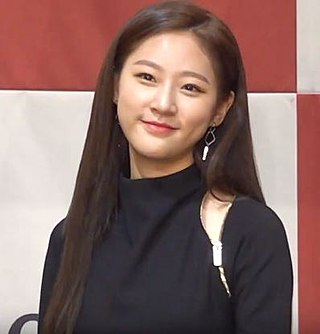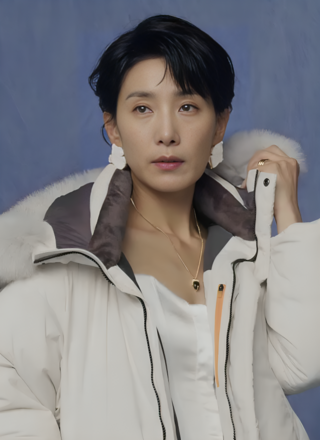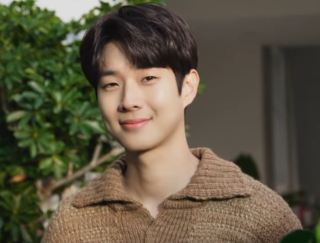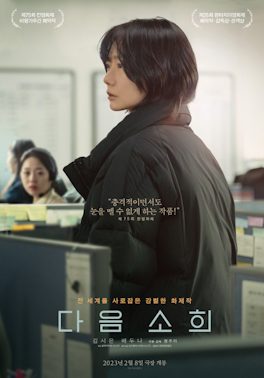
Yunjin Kim is a South Korean and American actress. She is best known for her role as North Korean spy Bang-Hee in the South Korean film Shiri (1999) and Sun-Hwa Kwon on the American television series Lost (2004–2010). Her other notable works include Seven Days (2007), Harmony (2010), The Neighbors (2012), and Ode to My Father (2014).

Bae Doona, anglicized as Doona Bae, is a South Korean actress and photographer. She became known outside Korea for her roles as a political activist in Park Chan-wook's Sympathy for Mr. Vengeance (2002), archer Park Nam-joo in Bong Joon-ho's The Host (2006), and as the doll in Hirokazu Kore-eda's Air Doll (2009). She has had English-speaking roles in the Wachowski films Cloud Atlas (2012) and Jupiter Ascending (2015), as well as the Netflix television series Sense8 (2015–2018) and film Rebel Moon (2023–2024). In Korean-speaking roles, she is well known as the leading female character in the crime thriller Stranger (2017–2020), the Netflix period zombie thriller, Kingdom (2019–2020), and the sci-fi limited series The Silent Sea (2021).

Jung Woo-sung is a South Korean actor. Jung started his career as a fashion model, rising to stardom with the gangster film Beat (1997), for which he won Best New Actor at the 17th Korean Association of Film Critics Awards.

Jung Yu-mi is a South Korean actress. Jung made her feature film debut in Blossom Again (2005), for which she received positive notice. She has since starred in the critically acclaimed films Family Ties (2006), Chaw (2009), My Dear Desperado (2010), Sleep (2023), and the box office hits The Crucible (2011), Train to Busan (2016) and Kim Ji-young: Born 1982 (2019). She also frequently appears in films by auteur Hong Sang-soo, notably Oki's Movie (2010) and Our Sunhi (2013). Jung has drawn praise for her unique screen presence and versatility.

Kim Sae-ron is a South Korean actress. She began her career when she was nine years old and became a popular child star through the films A Brand New Life (2009) and The Man From Nowhere (2010). As Kim reached her teenage years, she was cast in more leading roles, notably in the film A Girl at My Door (2014). She has also starred in television drama series, including Listen to My Heart (2011), The Queen's Classroom (2013) and Hi! School-Love On (2014). Her first adult lead role was in the television drama Secret Healer (2016).

Ahn So-hee, known mononymously Sohee, is a South Korean actress and former singer. She is a former member of the South Korean girl group Wonder Girls. She is best known for her performance in the film Train to Busan (2016).

Kim Go-eun is a South Korean actress. She debuted in the film Eungyo (2012) where she won several Best New Actress awards in South Korea. She is also known for her roles in the television series Cheese in the Trap (2016), Guardian: The Lonely and Great God (2016–2017), Yumi's Cells (2021–2022), and Little Women (2022), as well as the films Coin Locker Girl (2015), Hero (2022), and Exhuma (2024).

Kim Seo-hyung is a South Korean actress. She is best known for her portrayal as the evil mistress Shin Ae-ri in the SBS revenge drama Temptation of Wife (2008) and as Coach Kim in the JTBC television series Sky Castle (2018), for which she received a Best Actress nomination at the 55th Baeksang Arts Awards.

Choi Woo-shik, or Edward Choi, is a Canadian actor based in South Korea. He first gained widespread recognition for his leading role in the film Set Me Free (2014). He then co-starred in the films Train to Busan (2016) and Parasite (2019), both of which received international critical acclaim and success, the latter winning the Palme d'Or at Cannes and the Academy Award for Best Picture. He also played the lead role in the popular television series Our Beloved Summer(2021–2022).

A Girl at My Door is a 2014 South Korean drama film directed by July Jung and stars Bae Doona as a policewoman who takes in an abused girl played by Kim Sae-ron. The film screened in the Un Certain Regard section at the 2014 Cannes Film Festival.
The Korean Association of Film Critics Awards (Korean: 한국영화평론가협회상), also known as the Critics Choice Awards, is an annual awards ceremony for excellence in film in South Korea. It was established in 1980 by the Korean Association of Film Critics (KAFC). The ceremony is usually held in November.

Chun Woo-hee is a South Korean actress. She made her acting debut in 2004, but first drew attention with her supporting role as a rebellious teenager in the box-office hit Sunny (2011). Her other notable roles include Han Gong-ju (2013), The Piper (2015), The Beauty Inside (2015), Love, Lies (2016), The Wailing (2016) and The Atypical Family (2024).

Park Jeong-min is a South Korean actor, writer, and book publisher. Known as a prolific Chungmu-ro actor, he is most acclaimed for starring in the films Bleak Night (2011), Dongju: The Portrait of a Poet (2016), Keys to the Heart (2018), Deliver Us from Evil (2020), and Smugglers (2023). He is also the writer of best-selling book A Useful Person.

Lee Soo-kyung, is a South Korean actress. She is the youngest two-time winner of Baeksang Arts Awards, one of the most prestigious entertainment awards in South Korea, for Best Supporting Actress with 2017 and 2021 films Heart Blackened and Miracle: Letters to the President.

Kim Sun-young is a South Korean actress. She has performed in a variety of popular dramas, including Reply 1988 (2015), Because This is My First Life (2018), Romance is a Bonus Book (2019), When the Camellia Blooms (2019), Vagabond (2019), Crash Landing On You (2019), and Backstreet Rookie (2020). She won the Best Supporting Actress award at the Chunsa Film Art Awards and Wildflower Film Awards for her performance in Communications and Lies. Kim has received the Best Supporting Actress Award at the 56th Baeksang Arts Awards for her role on Crash Landing On You.

Lee Sang-hee, born Lee Na-ri (이나리), is a South Korean actress. She first became known for her role in the film End of Winter (2014). She later rose to prominence and gained recognition for her role in the film Our Love Story (2016). She also appeared in television series such as Children of the 20th Century (2017) and One Spring Night (2019).

Kim Hye-yoon is a South Korean actress who gained prominence for her role as Kang Ye-seo in JTBC's television series Sky Castle (2018–2019). She has received several notable accolades, including awards from the Baeksang Arts Awards, Blue Dragon Film Awards, and Grand Bell Awards, and was featured by Forbes in their 30 Under 30 list.

Next Sohee is a 2022 South Korean drama film, directed by Jung Ju-ri and starring Bae Doona and Kim Si-eun. The film revolves around a business-oriented high school student, Sohee, who has to go on field training to her call center, and a female detective, Yu-jin, who investigates her subsequent death. It is loosely inspired by the real-life suicide of a girl on a similar temporary training program. It was selected as the first Korean closing film at the 2022 Cannes Film Festival and screened as part of the Critics' Week section for special screenings.

Kim Si-eun is a South Korean actress. Kim is known for her titular role in Next Sohee (2022) and Squid Game (2024).
Ahn Tae-jin is a South Korean film director and filmmaker. He is known for his historical film The Night Owl (2022), for which he has received numerous accolades as the best new director. Some of these awards include the 28th Chunsa International Film Festival New Director Award, the 28th Chunsa International Film Festival Screenplay Award, the 44th Blue Dragon Film Awards New Director Award, and the 59th Grand Bell Awards Film Festival New Director Award.


















